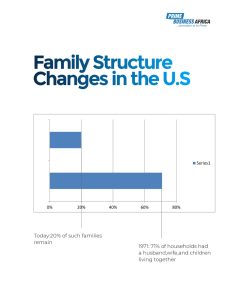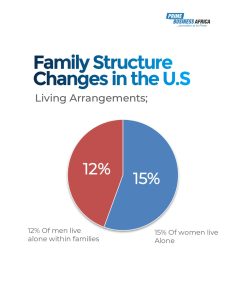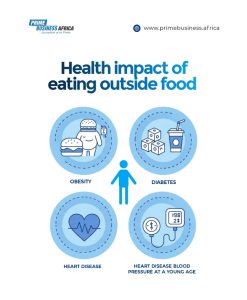Remember the aroma of simmering stew, the rhythmic clatter of spoons, and the playful chatter that once filled every Nigerian kitchen? That cherished symphony, a hallmark of family life, is slowly fading.
From time immemorial, the kitchen has been more than a place where meals are prepared. In Nigerian households, it was the hearth around which families gathered, the school where values were taught, and the table where love was served alongside food. Cooking was never just a chore; it was the glue that held families together.
Join our WhatsApp ChannelBut today, the Nigerian kitchen is falling silent. In bustling cities like Lagos, Port Harcourt, and Abuja, more families are abandoning home cooking in favour of fast food, food deliveries, or solitary meals. What appears to be convenience is slowly stripping the family of one of its oldest bonds.
The lesson from elsewhere is sobering. In the United States of America, home cooking began to decline in the 1980s as eating out and food delivery became the norm. Some economists warned then: “If the government takes over the care of children and the elderly, and private companies also handle meal preparation, the family structure will weaken.” Few paid attention.
Today, the picture is clear: in 1971, 71% of American households had a husband, wife, and children living together. Now, only 20% of such families remain. Many of the rest are scattered in nursing homes, lonely apartments, or disconnected lives. Divorce rates climbed, more children were born out of wedlock, and millions live alone. This is no accident. It is the social cost of shutting down the kitchen.
Nigeria is not there yet, but the patterns are strikingly familiar. We once sat together to share bowls of jollof rice, egusi soup, or yam pottage. Mothers and grandmothers stirred pots with stories, and children learned patience and responsibility by fetching water or grinding pepper. The kitchen is not just a place where calories are shared, but also where lessons are learned about discipline, duty, and love. Today, a generation is growing up more familiar with restaurant menus than family recipes, more used to eating alone than breaking bread together.
The cost goes beyond culture. The family unit itself is fraying. Shared meals once provided the rhythm of togetherness. They offered children a daily dose of guidance, elders a chance to be heard, and couples a space to reconnect. Without them, the home risks becoming a transit camp where individuals share a roof but not a life.
READ ALSO: Why Nigeria’s Farms Struggle While Its Food Imports Soar
Power Play: NERC Steps In to Resolve States-DisCos Tariff Dispute
The health cost is equally stark. Nigeria is now grappling with rising rates of obesity, diabetes, and hypertension, even among the young. Fast foods and processed meals, often heavy with salt, sugar, and poor-quality oils, fill bellies but compromise long-term wellbeing. In chasing convenience, families are outsourcing nourishment to businesses driven not by care, but by profit.
And yet, there is still a way back. To light up the kitchen again is not to romanticize the past; it is to reclaim what is essential. Cooking at home restores control over what we eat, revives conversations that deepen relationships, and anchors children in the warmth of belonging. It is not only a return to healthier diets but also to healthier families.
When cooking stops at home, families unravel. But when kitchens come alive again, they bind generations, nurture love, and offer security in a rapidly changing world. The future of the Nigerian family, in essence, might just be found within the vibrant, steaming heart of its rediscovered kitchen.
The challenge before Nigerian families is simple but urgent: to rediscover the kitchen as more than a room. It is the heartbeat of the home, and in its silence lies the quiet collapse of family life.
Amanze Chinonye is a Staff Correspondent at Prime Business Africa, a rising star in the literary world, weaving captivating stories that transport readers to the vibrant landscapes of Nigeria and the rest of Africa. With a unique voice that blends with the newspaper's tradition and style, Chinonye's writing is a masterful exploration of the human condition, delving into themes of identity, culture, and social justice. Through her words, Chinonye paints vivid portraits of everyday African life, from the bustling markets of Nigeria's Lagos to the quiet villages of South Africa's countryside . With a keen eye for detail and a deep understanding of the complexities of Nigerian society, Chinonye's writing is both a testament to the country's rich cultural heritage and a powerful call to action for a brighter future. As a writer, Chinonye is a true storyteller, using her dexterity to educate, inspire, and uplift readers around the world.
- Amanze Chinonye
- Amanze Chinonye
- Amanze Chinonye
- Amanze Chinonye
- Amanze Chinonye
- Amanze Chinonye
- Amanze Chinonye
- Amanze Chinonye
- Amanze Chinonye
- Amanze Chinonye
- Amanze Chinonye
- Amanze Chinonye
- Amanze Chinonye
- Amanze Chinonye
- Amanze Chinonye
- Amanze Chinonye
- Amanze Chinonye
- Amanze Chinonye
- Amanze Chinonye
- Amanze Chinonye
- Amanze Chinonye
- Amanze Chinonye
- Amanze Chinonye
- Amanze Chinonye
- Amanze Chinonye
- Amanze Chinonye
- Amanze Chinonye
- Amanze Chinonye
- Amanze Chinonye
- Amanze Chinonye
- Amanze Chinonye
- Amanze Chinonye
- Amanze Chinonye
- Amanze Chinonye
- Amanze Chinonye
- Amanze Chinonye
- Amanze Chinonye
- Amanze Chinonye
- Amanze Chinonye
- Amanze Chinonye
- Amanze Chinonye
- Amanze Chinonye
- Amanze Chinonye
- Amanze Chinonye
- Amanze Chinonye
- Amanze Chinonye
- Amanze Chinonye
- Amanze Chinonye
- Amanze Chinonye
- Amanze Chinonye
- Amanze Chinonye
- Amanze Chinonye
- Amanze Chinonye
- Amanze Chinonye
- Amanze Chinonye
- Amanze Chinonye
- Amanze Chinonye
- Amanze Chinonye
- Amanze Chinonye
- Amanze Chinonye
- Amanze Chinonye
- Amanze Chinonye
- Amanze Chinonye
- Amanze Chinonye
- Amanze Chinonye
- Amanze Chinonye
- Amanze Chinonye
- Amanze Chinonye
- Amanze Chinonye
- Amanze Chinonye
- Amanze Chinonye
- Amanze Chinonye
- Amanze Chinonye
- Amanze Chinonye
- Amanze Chinonye
- Amanze Chinonye
- Amanze Chinonye
- Amanze Chinonye
- Amanze Chinonye
- Amanze Chinonye
- Amanze Chinonye
- Amanze Chinonye
- Amanze Chinonye
- Amanze Chinonye
- Amanze Chinonye
- Amanze Chinonye
- Amanze Chinonye
- Amanze Chinonye
- Amanze Chinonye
- Amanze Chinonye
- Amanze Chinonye
- Amanze Chinonye
- Amanze Chinonye
- Amanze Chinonye
- Amanze Chinonye
- Amanze Chinonye
- Amanze Chinonye
- Amanze Chinonye
- Amanze Chinonye
- Amanze Chinonye
- Amanze Chinonye
- Amanze Chinonye
- Amanze Chinonye
- Amanze Chinonye
- Amanze Chinonye
- Amanze Chinonye
- Amanze Chinonye
- Amanze Chinonye
- Amanze Chinonye
- Amanze Chinonye
- Amanze Chinonye
- Amanze Chinonye
- Amanze Chinonye
- Amanze Chinonye
- Amanze Chinonye
- Amanze Chinonye
- Amanze Chinonye
- Amanze Chinonye
- Amanze Chinonye
- Amanze Chinonye
- Amanze Chinonye
- Amanze Chinonye
- Amanze Chinonye
- Amanze Chinonye
- Amanze Chinonye
- Amanze Chinonye
- Amanze Chinonye
- Amanze Chinonye
- Amanze Chinonye
- Amanze Chinonye
- Amanze Chinonye
- Amanze Chinonye
- Amanze Chinonye
- Amanze Chinonye
- Amanze Chinonye
- Amanze Chinonye
- Amanze Chinonye
- Amanze Chinonye
- Amanze Chinonye














